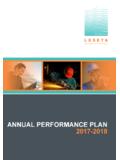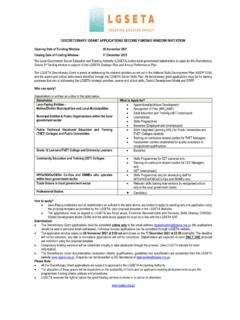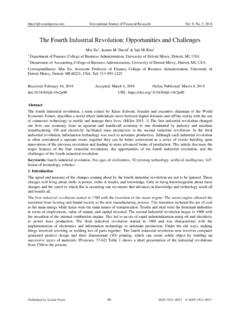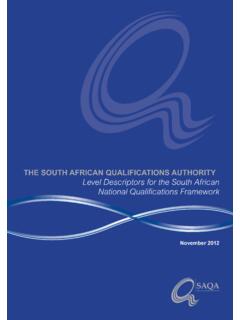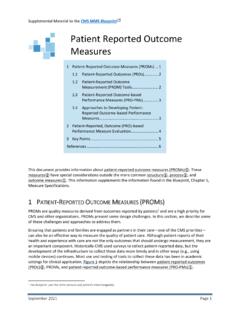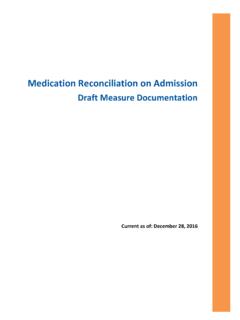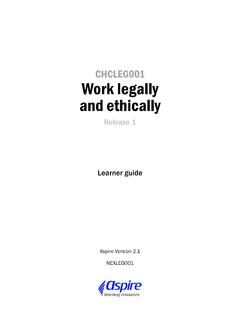Transcription of Criteria and Guidelines for Assesment of NQF Registered ...
1 Criteria andGuidelinesfor Assessment ofNQF Registered Unitstandards andQualificationsP0 LICY DOCUMENTP lease refer any queries in writing to:The Executive OfficerSAQAA ttention: Director, Quality Assurance and DevelopmentPostnet Suite 248 Private Bag X06 BROOKLYN0145 PretoriaSOUTH AFRICAFax: (012) 346-5809 Email: date: October 2001 ISBN: 0958441944 Funded by the European Union under the EuropeanProgramme for Reconstructionand DevelopmentCriteria and Guidelines for Assessment of NQF RegisteredUnit standards and QualificationsTHE SOUTH AFRICANQUALIFICATIONS AUTHORITYT able of Contents1 Introduction5 Purpose of this Document5 The Need for this Document52 Assessment and the NQF8 The Principles of the NQF and Assessment8 The Objectives of the NQF93 Overview of Assessment15 Introduction15 The Principles of good Assessment161.
2 Fairness162. Validity173. Reliability184. Practicability19 OBET and Assessment20 Criterion-referenced Assessment24 Formative and Summative Assessment26 Assessment Methods and Instruments27 Evidence36 Quality of Evidence36 Types of Evidence384 NQF Standards and Assessment40 Unit Standards and Assessment40 The Qualification and Assessment43 Recognition of Prior Learning445 The Assessor45 Introduction45 The Role of the Assessor45 The Expertise of the Assessor46 Who should assess?476 The Assessment Process49 Introduction49 Steps in the Assessment Process49Re-assessment and Appeals53 Integrated Assessment55 Language and Assessment587 Moderation59 Introduction59 How does Moderation occur?
3 60 Responsibilities of SAQA and its associated bodies64 Planning for Moderation65 Designing a Moderation System65 The Management Structure66 Components of a Moderation System66 Moderation Methods68 Definition of terms69 Criteria and Guidelines for Assessment of NQF Registered Unit standards and Qualifications 5 Chapter 1 IntroductionPurpose of this DocumentThese Guidelines are applicable to the assessment of education and training qualifications andstandards Registered on any level of the NQF and offered in any learning site in the educationand training NOTE:These Guidelines are flexible and are intended to provide opportunities for ETQA and providerinnovation and , the Guidelines cover the following areas: Goodassessment practiceas it relates to the NQF; Therole ofregisteredassessors; Theassessment process.
4 And Moderationof Need for this DocumentThe South African Qualifications Authority (SAQA), Act No 58 of 1995, stipulates theprimary functions of SAQA as being: To oversee the development of the National Qualifications Framework (NQF) To formulate and publish policies and Criteria for:i) The registration of bodies that are responsible for establishing standards and qualifications,that is National Standards Bodies (NSB s) and Standards Generation Bodies (SGB s)Purpose of this DocumentThe Need for this DocumentThe purpose of this document is to provide guidelinesfor the assessment policies,systemsandproceduresof SAQA accredited Education and Training Quality Assurance bodies (ETQA s) andtheir constituent )
5 The accreditation of bodies responsible for the monitoring and auditing of the quality ofthe teaching and learning provision for the achievement of Registered standards andqualifications, that is Education and Training Quality Assurance bodies (ETQA s). To oversee the implementation of the NQF which includes:i) Registering SGB s, NSB s, and standards and qualificationsii) Accrediting ETQA s. To ensure international comparability of Registered standards and order to enable SAQA to carry out these functions within a regulatory framework, SAQAhas formulated and published the following regulations:The National Standards Bodies Regulations No 18787 of 28 March 1998.
6 And TheEducation and Training Quality Assurance Bodies Regulations No 19231 of 8 September :QUALITYASSURANCE ANDDEVELOPMENT6 Criteria and Guidelines for Assessment of NQF Registered Unit standards and QualificationsThe ETQA Regulations are one layer of an enabling and regulatory frameworkfor the development and implementation of the is now in the process of formulating operational Criteria and guidelinesfor the implementation of the processes and systems of the NQF, hence thepublication of these following Guidelines fall within the quality assurance functions of ETQA s.
7 TheETQAR egulationsstate in section 9 (1) Functions of Education and Training QualityAssurance Bodies that an ETQA shall:(d) Evaluate assessment and facilitate moderation among constituent providers;(e) Register constituent assessors for specified Registered standards or qualifications in termsof the Criteria established for this purpose;(f) Take responsibility for the certification of constituent , the ETQA Regulations specify as a criterion for the accreditation of providers evidence of the provider s quality management systems, which include policies and practicesfor the management of , it is not only the imperatives contained in the Act and the Regulations that necessitatethese NQF is an outcomes based education and training framework for education and trainingstandards and qualifications.
8 As such, the assessment practices and procedures for the NQFhave to be aligned to those of an outcomes based education and training , the objectives of the NQF contain principles particular to the transformationimperatives of the new and emerging education and training system in South Africa. Therefore,assessment practices and procedures for the NQF need to be aligned and Guidelines for Assessment of NQF Registered Unit standards and Qualifications 71To summarize:Flexible Guidelines forSAQA accredited ETQAsThe ETQA regulations(No19231 of 8/9/98)Evaluate assessment andfacilitate moderation among constituentproviders;Register constituent assessorsfor specific Registered standards orqualifications in terms of the Criteria established for this purpose.
9 Take responsibility for the certificationof constituent learnersPolicies and practices for the management of assessmentTheassessment practices and proceduresfor an outcomes basededucation and training systemThetransformation imperativesof the new and emerging education andtraining system of South AfricaThis documentcontains-The guide-lines dealwith:Lastly, this document contains particular principles relating to: Good assessment practice Role of assessors Assessment process ModerationThis documentis based on -This document is intended to be an enabling and regulatoryframework so that ETQA s can:This document talks to providers quality management systems, in particular to the:Also, this document takes as its point of departure:DIRECTORATE.
10 QUALITYASSURANCE ANDDEVELOPMENT8 Criteria and Guidelines for Assessment of NQF Registered Unit standards and QualificationsChapter 2 Assessment and the NQFThe Principles of the NQF and AssessmentIn addition to outcomes based education and training (OBET), being the framework forassessment policies, systems and procedures for NQF Registered standards andqualifications, the underlying principles and objectives of the NQF should underpin suchpolicies, systems and rationale for the establishment of the NQF is rooted in: The history of South Africa and the reconstruction and development goals of the newdemocratic government of this country.

